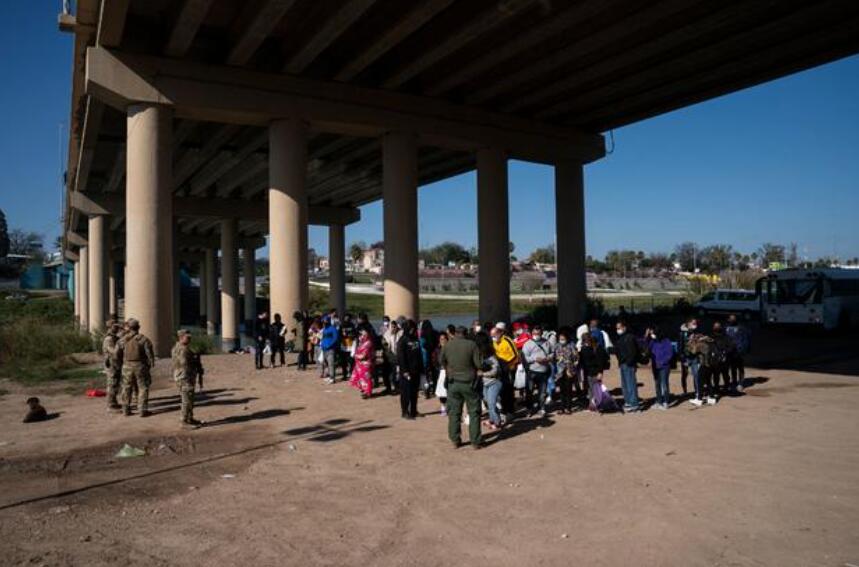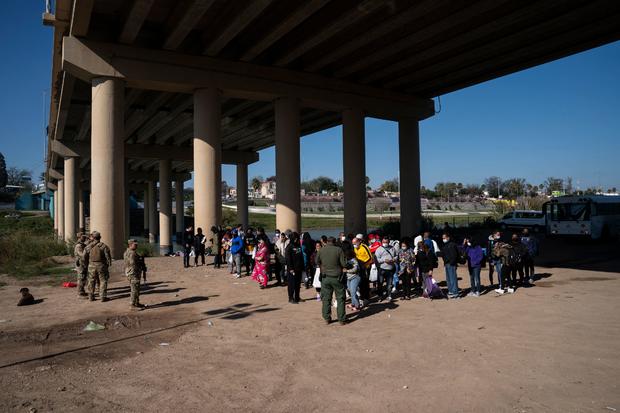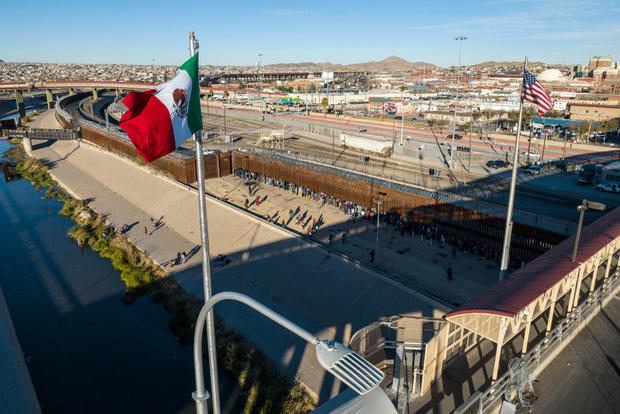The Biden administration is planning to announce on Thursday a “carrot and stick” migration management strategy that officials hope will reduce the historically high levels of unlawful crossings along the U.S.-Mexico border, two people familiar with the plans told CBS News.
The effort would involve allowing migrants from Nicaragua, Cuba and Haiti with U.S.-based financial sponsors to enter the country legally through a program modeled after Biden administration policies that have offered a safe haven to displaced Ukrainians and Venezuelans.
Eligible migrants from these crisis-stricken countries would enter the U.S. under the humanitarian parole authority, which allows beneficiaries to live and work in the U.S. legally on a temporary basis.
This expanded legal pathway, which would be capped at 30,000 admissions each month, would be paired with a deterrence measure designed to discourage illegal entries along the southern border, the people familiar with the plans said. Under the plan, migrants from Nicaragua, Cuba and Haiti would face immediate expulsion to Mexico under the Title 42 pandemic-era measure if they cross the U.S. border illegally, a policy shift that would require the consent of the Mexican government.
For over two years, the Mexican government only accepted the return of its citizens and migrants from Guatemala, Honduras and El Salvador expelled from the U.S. under Title 42, a public health law that was first invoked by the Trump administration in early 2020. But in October, the Biden administration convinced Mexico to accept Venezuelan migrants as part of a deal in which the U.S. committed to allowing up to 24,000 Venezuelans to enter the country legally under the parole authority.
The dual policies led to a dramatic drop in the number of Venezuelans entering U.S. border custody, and Biden administration officials pledged to “build on” on the strategy’s success.
Representatives for the White House and the Department of Homeland Security did not immediately respond to requests for comment on Thursday’s announcement.
The expansion of Title 42 to include migrants from Cuba and Nicaragua would be a seismic shift in U.S. policy, as the vast majority of the tens of thousands of Cubans and Nicaraguans processed along the southern border over the past year have been released and allowed to seek asylum due to their home countries severely limiting U.S. deportations.
Mass exoduses from Cuba and Nicaragua have contributed to record levels of U.S. border apprehensions in the past year. In recent months, arrivals from these countries have surpassed the number of Guatemalan, Honduran and Salvadoran migrants entering U.S. border custody, an unprecedented demographic change.
The new effort would also represent a dramatic and unprecedented expansion of the parole authority, which the Biden administration has already used to resettle tens of thousands of refugees from Afghanistan and Ukraine.
U.S. law allows immigration officials to use the parole authority to admit immigrants who otherwise don’t have legal permission, such as a visa, to enter the U.S. if their entry is deemed to be justified on humanitarian or public interest grounds.
President Biden will outline his strategy along the U.S.-Mexico border Thursday at the White House in what will be his first speech solely focused on border policy. Mr. Biden is also expected to call on Congress to reform the U.S. immigration system and legalize so-called DREAMers and other immigrants living in the country without legal status, including farmworkers, a person familiar with the speech said.
On Wednesday, Mr. Biden said it’s his “intention” to visit the U.S. southern border during his trip to Mexico next week.
The humanitarian crisis along the southern border has become a political liability for Mr. Biden, who has been accused by Republicans of ignoring the issue. They’ve also argued the record border arrivals reported over the past two years stem from the Biden administration’s decision to reverse some Trump-era policies, including a program that required certain migrants to wait for their asylum hearings in Mexico.
In fiscal year 2022, U.S. Border Patrol agents stopped migrants 2.2 million times along the southern border, an all-time high that surpassed the record set the previous year, federal figures show. More than 1 million of those encounters resulted in migrants being expelled from the U.S. under Title 42.
While it revoked some of the Trump administration’s asylum restrictions, the Biden administration maintained Title 42 for over a year, defending the Trump-era argument that the policy was needed to control the spread of COVID-19.
In April 2022, the Centers for Disease Control and Prevention said it would stop authorizing Title 42 due to improving pandemic conditions, including higher vaccination rates. But a group of Republican-led states convinced a federal judge in Louisiana to block the rule’s termination on procedural grounds.
Then, on Nov. 15, another federal judge declared Title 42 unlawful, saying the CDC had not properly explained the policy’s public health rationale or considered its impact on asylum-seekers. At the request of the Biden administration, the judge gave border officials 5 weeks, until Dec. 21, to end Title 42.
Nineteen Republican-led states asked several courts to delay Title 42’s rescission indefinitely, warning that chaos would ensue otherwise. After their request was denied by lower courts, the states asked the Supreme Court to intervene.
On Dec. 27, the Supreme Court said it would suspend the lower court order that found Title 42 to be illegal until it decided whether the Republican-led states should be allowed to intervene in the case, likely postponing the policy’s termination for months.


